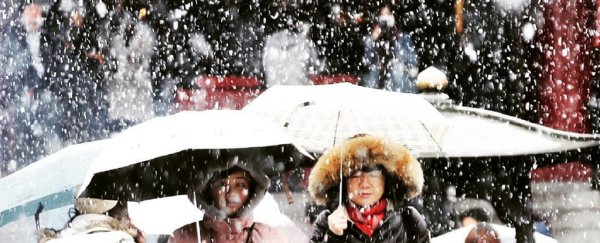The people of Tokyo aren't used to snow before Christmas, but the Japanese capital has seen its first snowfall in November for 54 years – and the first accumulation in the city centre since records began in 1875.
While the flurries have caused plenty of inconvenience for locals, meteorologists say this isn't yet a sign of a permanent shift, and that a series of factors combined by chance to bring the snow to Tokyo early this year.
The snow was coming down on Thursday morning as the city woke up, with up to 2 centimetres (0.8 inches) building up in central Tokyo as a cold front moved south. Out in the suburban areas close to the mountains, even more snow was sticking.
"Today's snowfall and accumulation occurred because several elements came together at once by chance," said government agency official Sakiko Nishioka, as Phys.org reports.
"It does not mean this can signal any unusual weather conditions this season such as a super cold winter."
The Japan Times reports the peculiarly cold temperatures were caused by Arctic air escaping from its normal route around the North pole, thanks to changes in atmospheric pressure known as the Arctic oscillation.
November temperatures in Tokyo usually average between 9 and 15 degrees Celsius in November (48-59 degrees Fahrenheit) but on Thursday they dropped close to zero degrees Celsius (or 32 degrees Fahrenheit).
Nothing serious, just charming: #Tokyo stunned by first November snow in 54 years (PHOTOS) https://t.co/fEDvJg7kzf pic.twitter.com/gLqzo2Vwo0
— RT (@RT_com) November 25, 2016
According to Reuters, more than 100 people were injured due to slipping or sliding on the unseasonal snow, but those who managed to stay upright got busy sharing the moment on social media, as you can see from the embeds in our post.
Tokyo residents aren't complete strangers to the icy white stuff – they even have a special word for the snow's arrival each year, which is "hatsuyuki" or literally, "first snow" – but it usually comes down in a few occasional dustings during January and February, and it sounds like a lot of citizens were caught unprepared.
〝early snow〟#雪 #snow #東京 #tokyo pic.twitter.com/gsPWUTogpG
— MST (@mst_the_one) November 24, 2016
"There was less snow than I expected so I thought everything would be okay, but the roads were really slippery and awful," university professor Mariko Kato told Reuters.
Buses and trains were delayed by the unusual snowfall but local media reports that tourists were more than happy to see the change in weather.
It didn't last though, with the snow quickly melting and turning to rain. Conditions are now brightening up in the Japanese capital so people can get back to their usual snow-free way of life.
So if you're hoping for a white Christmas this year, just remember – it's completely unheard of in many parts of the world.
